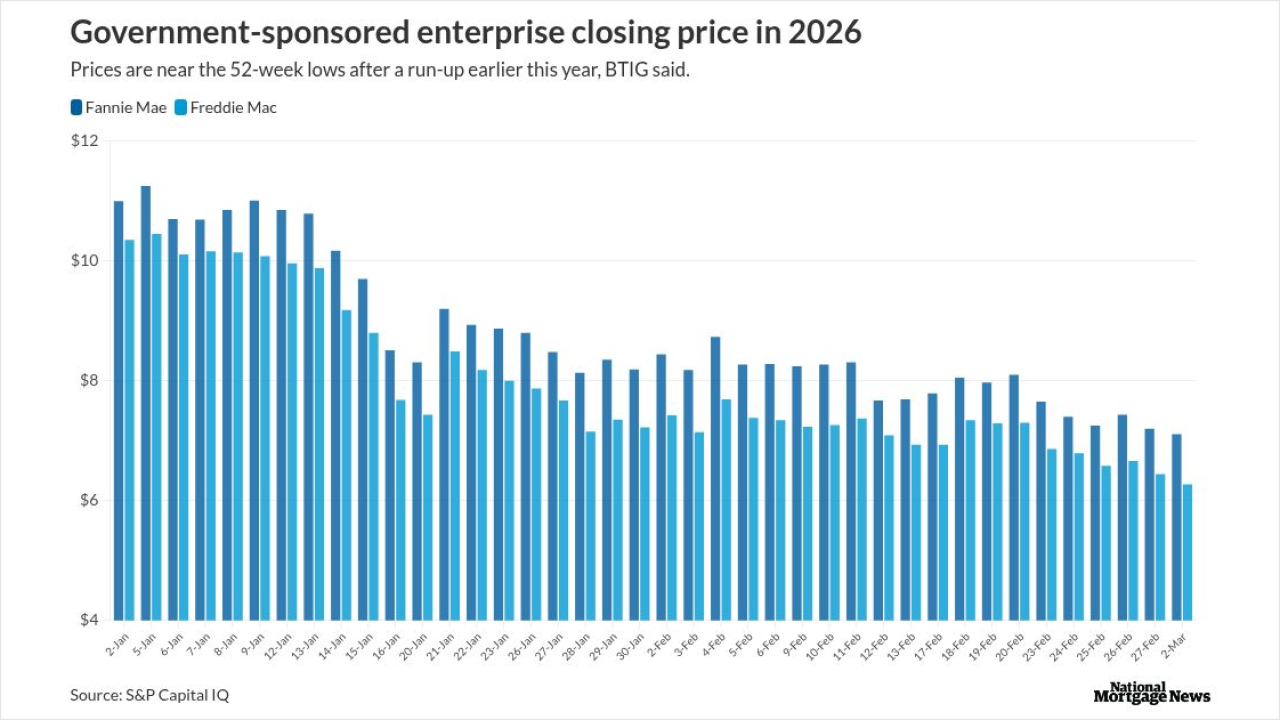The mortgage industry took it on the chin in 2023, with many of those same factors hurting it now likely to affect
That includes the Fed's own statements prior
While rates have
Smith noted more capacity needs to be wrung out of the system. And that brought him to one of the big lessons of 2023 that lenders must take to heart in the coming year.
Smith warned lenders that "if you're in the mortgage origination business, you want to be focused on profitability, not market share."
"Ultimately, if you're going to get through this, you've got to look at your revenue and your cost drivers and you've got to right size your operation accordingly," he said.
In 2021, mortgage lenders originated $4.6 trillion and when this year is said and done, it is likely to end at $1.6 trillion, or 65% fewer loans, he noted.
The December forecast from the Mortgage Bankers Association was unchanged at $1.64 trillion for 2023, but reduced slightly for 2024 to just above $2 trillion, approximately $19 billion
Its outlooks for 2025 of $2.34 trillion and for 2026 of $2.44 trillion were unchanged.
Flagstar has been very aggressive and cut that 65% from its operations, but
"You're going to have to resize your infrastructure in order to get to profitability, and that's going to be the key to getting through 2024," Smith said.
At the Mortgage Bankers Association annual convention in October, the mantra expressed by many in the room was "survive until '25."
But hope is not a winning business strategy and that should be the takeaway for many lenders this year, added Garth Graham, senior partner at Stratmor Group.
Graham referred to a smaller company that Stratmor works with as a unicorn because it never lost sight of its productivity and costs, even in the up markets.
That business does not add staff at times volume picks up, which might cost it a deal or two.
"I'm not going to just keep throwing bodies at it in the good times," Graham said this originator told him. "Because I know what's going to happen, and it's too many bodies to shed and I can't shed them fast enough in the bad times."
This person's planning includes a base case taking into account both positive and negative scenarios. That includes knowing one's numbers and aggressively managing to them.
A radical suggestion crafted from past difficulties is to change the industry compensation structure.
"This is not the lesson learned," he said. "It's a lesson I tried to give, and our industry can't seem to learn it."
Graham would keep commissions, but rather than paying based on a percentage basis especially
"Just because the house costs 50% as much doesn't make your job worth 50% more," Graham explained.
It doesn't hurt to have a balanced business model, Graham said. That means having more than one origination channel in place, or having a servicing business that brings in countercyclical income.
Smith noted that Flagstar is not just an originator, it is a bank and able to keep assets on its balance sheet. If anything, the completion of
"So we feel confident that we can generate strong earnings in any interest rate environment, and if you only have one business which is originating, you don't have that diversity," Smith said.
"The merger with NYCB and the
The balance sheet can also be used for mortgage servicing rights, other product offerings or other asset classes. Flagstar is also a significant warehouse line of credit provider.
Luxury Mortgage had
But the turmoil in the marketplace related to the pandemic forced Starwood out and required that Luxury Mortgage do a quick pivot.
"And so, I would say that the lessons learned from last year and this year is diversification is key, not only geographic, but also channel, product, and also execution diversification," said Adamo.
"The market dynamics can be very unforgiving for those who haven't diversified out risk and in our industry, there's risk around every corner. Risk comes up and down the production cycle to the left and to the right."
In 2020, Luxury had to shift to accessing the government-sponsored enterprises directly as its exit strategy instead of selling to bank aggregators as servicing prices collapsed. Over time, Luxury divested its various production channels to concentrate on being a non-QM correspondent.
"Retail was going to continue to experience volume contraction, margin contraction and expense expansion," Adamo said. "And so we felt that a better path forward for between 2022 and 2023 would be to just focus on channels where we could do higher volume with lower fixed costs, and a product category that we have developed a core competency and multiple strategic advantages."
The shift also meant Luxury needed to cultivate a new funding source,
And those are just some of the 2023 lessons that lenders need to bring to the fore in 2024.




